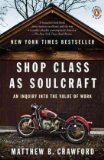on the “stochastic arts” – excerpt from ‘Shop Class as Soulcraft: An Inquiry into the Value of Work’
Written on May 28, 2010
Shop Class as Soulcraft: An Inquiry into the Value of Work by Matthew B. Crawford (Penguin, 2009)
(‘The Case for Working with Your Hands’ at Amazon.co.uk)
excerpt, pp 81-82
Some arts reliably attain their object—for example, the art of building. If the building falls down, one can say in retrospect that the builder didn’t know what he was doing. But there is another class of arts that Aristotle calls “stochastic.” An example is medicine. Mastery of a stochastic art is compatible with failure to achieve its end (health). As Aristotle writes, “It does not belong to medicine to produce health, but only to promote it as much as is possible….” (Aristotle, Rhetoric, 1355b12) Fixing things, whether cars or human bodies, is very different from building things from scratch. The mechanic and the doctor deal with failure every day, even if they are expert, whereas the builder does not. This is because the things they fix are not of their own making, and are therefore never known in a comprehensive or absolute way. This experience of failure tempers the conceit of mastery; the doctor and mechanic have daily intercourse with the world as something independent, and a vivid awareness of the difference between self and nonself. Fixing things may be a cure for narcissism.
…
Because the stochastic arts diagnose and fix things that are variable, complex, and not of our own making, and therefore not fully knowable, they require a certain disposition toward the thing you are trying to fix. This disposition is at once cognitive and moral. Getting it right demands that you be attentive in the way of a conversation rather than assertive in the way of a demonstration. I believe the mechanical arts have a special significance for our time because they cultivate not creativity, but the less glamorous virtue of attentiveness. Things need fixing and tending no less than creating.
See also: Author’s website
video book talk from fora.tv:



